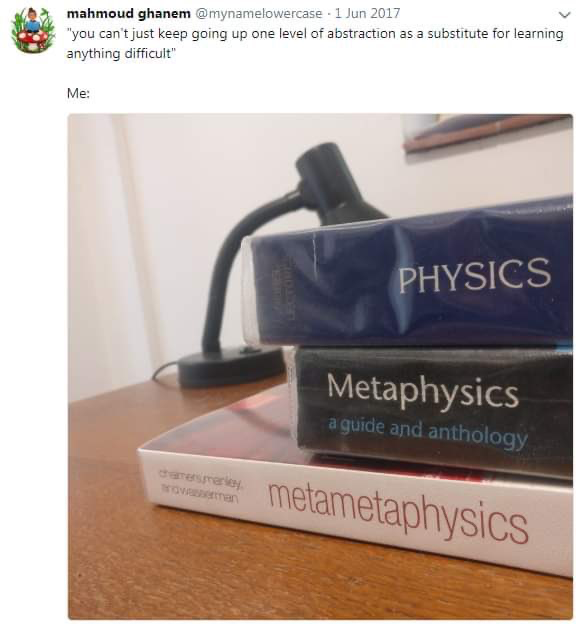Alternate title: You can't just keep going up one level of abstraction as a substitute for learning anything difficult
In 2017 I had the embarrassing revelation that for most of that year I had been making only one intellectual “move”, which was to make things more abstract and/or recursive and then stepping back to see what happens.
This was mainly affecting my academic work, but was also showing up in other parts of my life.
For example if someone asked me a question like “what makes a good conversation starter?” I’d reflexively answer “what makes ‘what makes a good conversation starter’ a good conversation starter?”1.
Or when I decided to make a Buzzfeed-style quiz to learn a new JavaScript library, I decided to call it “Which Buzzfeed quiz are you?”.
When I found there were three quizzes online already with similar names I decided to make “Which ‘Which Buzzfeed quiz are you?’ quiz are you?”. There were four possible outcomes: three were the quizzes I’d already found and the fourth one was this new quiz I was making linking back to itself.

The list goes on and on, and includes the list itself. That kind of thing was pretty much my brand.
Depending on your audience this all either goes down very well, or is just very annoying. When your audience are computer scientists and/or philosophers it goes down so well that you get to do it and say you are “writing essays about philosophical method” or “doing problem sheets on category theory” and people will encourage you to go to university and get lessons in how to it completely and precisely.
What made this revelation embarrassing was that, while this is all intellectually very satisfying and feels very creative and original, there’s a sense in which it is the most uncreative and unoriginal thing you can do in fields like logic, philosophy and math.
Fundamentally, asking: “what makes ‘what makes a good conversation starter’ a good conversation starter?” is a lazy way to avoid answering the actual question while still appearing clever.
In much the same way: if you are studying some abstract and technical subject, and you’re getting no exposure to the real world, and have no original ideas for things to apply your subject to, all you’re left with is to apply it to itself. It’s a safe and risk-free exercise you can do from inside your ivory tower, while still producing “clever” sounding work. 2
This moment of introspection did two things for me.
- It sealed the deal for my decision to get out of academia for a bit and try to get as close as possible to applying everything I’d learnt up to that point to solving problems in the real world; and
- It led me to produce my most popular meme, which briefly went so viral, that it was shared by Elon Musk.

In the months following I joked to my friends I was going on “meta rehab”, and asked them to call me out any time they noticed me avoiding doing something concrete by trying to solve a more abstract problem first. This went great: I learnt to be more practically-minded, got a job which exposed me to bits of reality outside of my own fields of study. I also got to spend more time building useful stuff.
I still have a soft spot in my heart for very meta and silly things though. Now that my "rehab" has served is purpose and come to an end, I find that can enjoy these ideas responsibly again, without the risk of being dragged up into ever increasing and ever more silly layers of abstraction.
For this reason I’m ending this post with a list of favourite examples of things that scratch the "meta and silly" itch. I am always delighted to encounter new things in this genre, so you can make my day by sending them to me. I'll continue to add examples here when I come across them.
- Wikipedia's List of Lists of Lists (which contains itself)
- This Bo Burnham skit

- Git ignores .gitignore with .gitignore in .gitignore
-
Both of us were almost certainly avoiding having an actual conversation. ↩
-
Of course, the fact that some tools can be rigorously applied to studying and/or improving themselves, and in this way can lead to huge progress in the respective field they come from is incredibly cool (and sometimes scary). It’s a topic for another post though. ↩